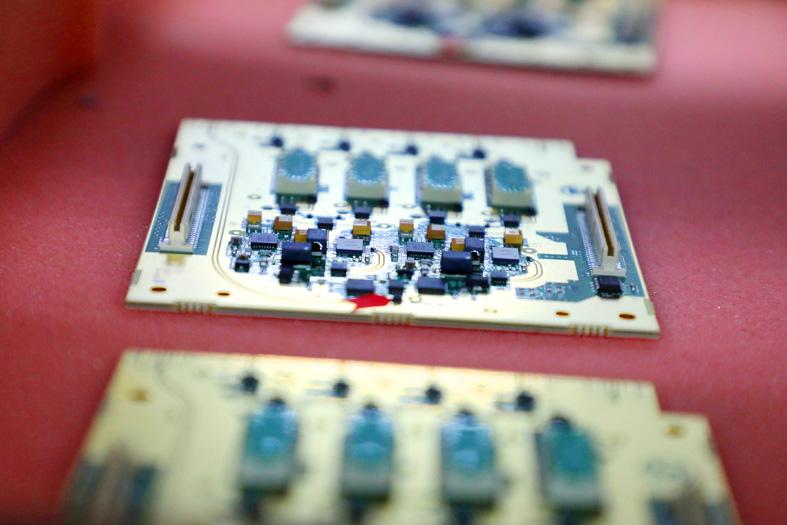Several Taiwanese manufacturers in the Chinese city of Kunshan said that they would remain closed at least until today, as city health authorities have extended a lockdown due to an increase in COVID-19 cases.
Many Taiwanese manufacturers of printed circuit boards (PCBs) and other components for consumer electronics, automobiles and other products have subsidiaries in Kunshan, which borders Shanghai, where the number of COVID-19 cases has surged in the past few weeks.
Unimicron Technology Corp (欣興電子), one of the leading PCB suppliers in Taiwan, on Wednesday said it was waiting for Kunshan authorities to give a new lockdown order before it could decide whether to resume production in the city.

Photo: Reuters
Its financial situation was not likely to be adversely affected by the suspension of production, Unimicron said.
Two other Taiwanese PCB manufacturers, Elite Material Co (台光電子材料) and Wus Printed Circuit Co (楠梓電子), said they had already notified clients about shipment changes due to the production pause and would continue to abide by the city's COVID-19 prevention regulations.
The Kunshan lockdown is likely to disrupt global supply chains as orders back up and companies such as Unimicron, which supplies Apple Inc, might be affected, analysts said.
Twenty to 25 percent of Unimicron's production and 30 to 40 percent of Elite Material's production is based in Kunshan, local media reports said.

Taiwan Semiconductor Manufacturing Co (TSMC, 台積電) last week recorded an increase in the number of shareholders to the highest in almost eight months, despite its share price falling 3.38 percent from the previous week, Taiwan Stock Exchange data released on Saturday showed. As of Friday, TSMC had 1.88 million shareholders, the most since the week of April 25 and an increase of 31,870 from the previous week, the data showed. The number of shareholders jumped despite a drop of NT$50 (US$1.59), or 3.38 percent, in TSMC’s share price from a week earlier to NT$1,430, as investors took profits from their earlier gains

In a high-security Shenzhen laboratory, Chinese scientists have built what Washington has spent years trying to prevent: a prototype of a machine capable of producing the cutting-edge semiconductor chips that power artificial intelligence (AI), smartphones and weapons central to Western military dominance, Reuters has learned. Completed early this year and undergoing testing, the prototype fills nearly an entire factory floor. It was built by a team of former engineers from Dutch semiconductor giant ASML who reverse-engineered the company’s extreme ultraviolet lithography (EUV) machines, according to two people with knowledge of the project. EUV machines sit at the heart of a technological Cold

Taiwan’s long-term economic competitiveness will hinge not only on national champions like Taiwan Semiconductor Manufacturing Co. (TSMC, 台積電) but also on the widespread adoption of artificial intelligence (AI) and other emerging technologies, a US-based scholar has said. At a lecture in Taipei on Tuesday, Jeffrey Ding, assistant professor of political science at the George Washington University and author of "Technology and the Rise of Great Powers," argued that historical experience shows that general-purpose technologies (GPTs) — such as electricity, computers and now AI — shape long-term economic advantages through their diffusion across the broader economy. "What really matters is not who pioneers

TAIWAN VALUE CHAIN: Foxtron is to fully own Luxgen following the transaction and it plans to launch a new electric model, the Foxtron Bria, in Taiwan next year Yulon Motor Co (裕隆汽車) yesterday said that its board of directors approved the disposal of its electric vehicle (EV) unit, Luxgen Motor Co (納智捷汽車), to Foxtron Vehicle Technologies Co (鴻華先進) for NT$787.6 million (US$24.98 million). Foxtron, a half-half joint venture between Yulon affiliate Hua-Chuang Automobile Information Technical Center Co (華創車電) and Hon Hai Precision Industry Co (鴻海精密), expects to wrap up the deal in the first quarter of next year. Foxtron would fully own Luxgen following the transaction, including five car distributing companies, outlets and all employees. The deal is subject to the approval of the Fair Trade Commission, Foxtron said. “Foxtron will be